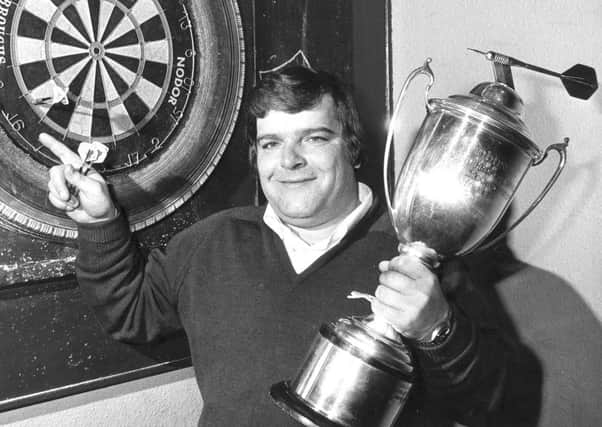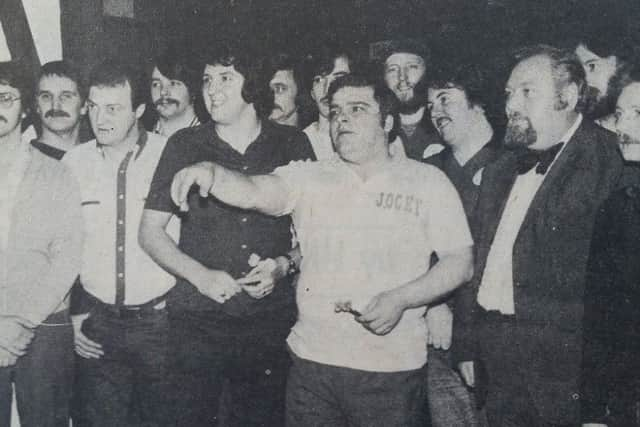Jocky Wilson: From Kirkcaldy to king of the darts world


Sid Waddell’s magnificent commentary will be recalled by many this week as BBC screens a documentary on one of the most unlikely of sporting legends.
Jocky Wilson went from a council house in Kirkcaldy to the top of the world and back again.
Advertisement
Hide AdAdvertisement
Hide AdHis legacy now belongs to another era, but it is one that will stand the test of time.


Two world titles, a place in at least the quarter-finals every year from 1979 to 1991, four British championships, and a plethora of stories that still spark a smile some 30 years on, it’s little wonder they recalled the wee man with such affection and warmth.
Bobby George - his great friend from darts’ golden era - told of Jocky turning up in America on tour with a suitcase which contained just one pair of socks. His explanation was simple - it looks better when checking into a hotel if you are carrying a case!
You may also be interested in:
In 2012, on hearing of Wilson’s death at the young age of 62, George wrote: ‘’Farewell John Thomas (Jocky) Wilson. We had some great times together. I will never forget you and your toothless grin!’’
Advertisement
Hide AdAdvertisement
Hide AdThose great times sat at the very heart of the sport’s golden era when TV came calling and turned the players into bona fide stars.
Waddell hailed him as ‘‘a darts legend, working class hero and an honorary Geordie’’ – Jocky, of course, was a fiercely proud Scot who loved nothing more than beating the English. Legend has it he lost his teeth after brushing them with Fanta because ‘‘my granny told me the English poisoned the water.’’
True or not, it’s another classic Jocky story – but one that also diverts you from his remarkable rise from the toughest of beginnings.
Waddell recalled how Jocky grew up in an orphanage because his parents were judged unfit to look after him. He went into the army from 1966 to 1968 before working as a miner and a chef at Seafield Colliery where he met Malvina, his wife.
Advertisement
Hide AdAdvertisement
Hide AdWith three children – John, Willie and Anne-Marie – money was incredibly tight.
Darts proved to be his salvation. It also, ultimately, didn’t help many of his problems with ill health as the lifestyle on the road – the booze, the fags – took an appalling toll.
Jocky started playing at the Lister Bar. He hustled to top up his dole money.
He turned pro in 1981 and, within 12 months, was world champ. No-one could throw an arrow with Jocky’s consistency.
Advertisement
Hide AdAdvertisement
Hide AdHe went into the event as British champion and emerged from eight days at the Jollee Nite Club, Stoke, as champion. The first Scotsman to ever lift the trophy. Naturally he brought it straight back to the Lister Bar, driving through the night to get home.
While some sportsmen would build a trophy cabinet to show off their silverware, Jocky gave his to go on display at Dysart Social and Recreation Club where he threw his first darts.
Fame and fortune beckoned – he was surely the first sportsman from these parts to have a computer game named after him by the then fledgling industry – but his roots remained firmly in Kirkcaldy.
When it all ended in 1995, amid bankruptcy and failing health, Jocky effectively retired with no announcement or fanfare. He and Malvina packed up their house in Wallsend and simply went home.
And Jocky closed the door.
Advertisement
Hide AdAdvertisement
Hide AdHe declined every request for an interview and every invitation to celebrate landmark anniversaries of his world titles.
He never sold his story, never sought pity. He simply left the stage. The 20th, 25th and 30th anniversaries of his first world tirle success passed with no comment from the great man himself.
His last interview came in 2007 when he spoke on his doorstep to journalist, Mike Wade.
In an era of agents, press oficers and lucrative media deals to sell your story, Jocky said thanks, but no thanks.
Advertisement
Hide AdAdvertisement
Hide AdHis reluctance to revisit the glory years was summed up at his front door when he said: “Ach, I enjoyed it while it lasted. But that’s life, eh? You get knocked for six, and then that’s it. I couldn’t do it now. I just want to be left alone because all they write about me is crap, and I don’t want to read about that. That’s it in a nutshell. I’m sorry. I don’t want to shut the door in your face.”
The tragedy is, upon his passing in 2012, all they wrote were tributes full of love for the wee man.
His death even made the leader page of The Times.
Last year he was the subject of an oustanding play ‘Jocky Wilson Said’ which enjoyed great success at the Edinburgh Festival Fringe, but which has yet to come to his home town.
This week, the 30th anniversary of his second world title is marked with a BBC documentary.
The boy from the Lister Bar will never be forgotten.
> A version of this article first appeared on www.fifetoday.co.uk in March 2012